Norton Antivirus Scams
Norton Antivirus is a software program created to safeguard computers and other
gadgets against a range of harmful software forms, encompassing viruses, spyware, adware, and other malicious programs. The software is developed by NortonLifeLock, previously recognized as Symantec Corporation, a company specializing in cybersecurity. The primary purpose of Norton Antivirus is to prevent, identify, and eliminate malicious software that might endanger a user’s computer, pilfer sensitive data, or undermine their digital security. This blog post explores the world of Norton Antivirus scams, delving into how these scams work and, more importantly, how you can safeguard yourself against them.
How do fake virus alerts work?
Fraudulent virus alerts serve dual purposes: Firstly, they aim to make you click on a compromised link, leading to a drive-by download, or direct you to a fictitious website where they push you to buy non-existent antivirus software. Much like other cyberattacks such as phishing and smishing, these deceptive virus alerts frequently employ urgent messages to frighten victims into making hasty and unwise choices. To counter fake virus scams, it’s essential to abstain from interacting with any part of the message. Instead, close the screen promptly. If these alerts persist, you can follow the removal guidelines below to restore your device to its normal state. Instances have emerged wherein cybercriminals have endeavored to exploit the reputation of Norton Antivirus to perpetrate scams. These scams manifest in diverse forms, which encompass:
1. Phishing Emails
Fraudsters commonly dispatch emails that present themselves as originating from Norton, conveying to recipients that their subscription has lapsed or their account is compromised. These emails frequently encompass malevolent links or attachments that, upon interaction, can result in the installation of malware or redirection to phishing websites intended to pilfer personal data.
Further deviations of the false Norton renewal notifications exist. These variants also employ tactics to startle recipients with a substantial invoice for an item they never acquired. This strategy is intended to provoke recipients into disregarding sound judgment and contacting the scammers (with their banking particulars) in an attempt to rectify the supposed error. It’s recommended to abstain from responding to such messages and instead, classify them as phishing attempts
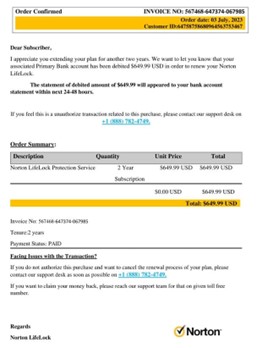
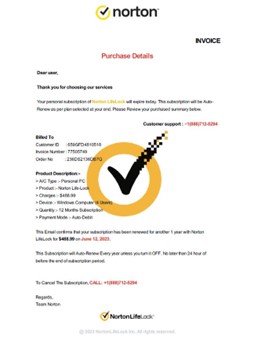
2. Fake Norton Support Calls
Scammers sometimes adopt the guise of Norton support personnel and reach out to individuals, alleging that their computers are infected with malicious software. They might propose assistance in resolving the problem remotely, yet their true intention is to acquire access to sensitive data or introduce genuine malware onto the user’s device.
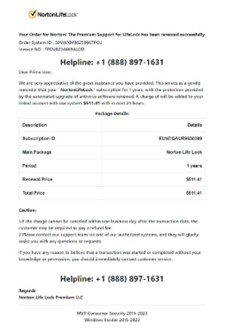
3. Fake Renewal Notices
Criminal actors dispatch counterfeit renewal notifications to individuals utilizing Norton Antivirus, directing them to renew their subscription by divulging their credit card details. These fraudulent notices are meticulously crafted to deceive users into sharing their financial information, with the ulterior motive of pilfering sensitive data for illicit purposes.
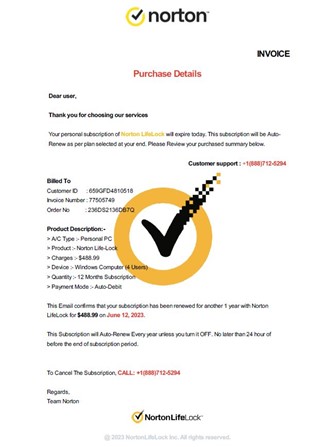
4. Norton Antivirus Investment Scam
Fraudsters fabricate fictitious investment prospects associated with the entity responsible for Norton Antivirus, enticing unsuspecting individuals to invest in the promise of substantial returns. Subsequently, these scammers abscond with the invested funds, leaving victims financially harmed and deceived.
5. Fake Norton Security Scan Popup Scam
The “Norton Security Scan” alert is a scam perpetrated through web browsers, aiming to deceive individuals into believing that a Norton antivirus scan has identified viruses on their system. The scam asserts that renewing an antivirus subscription is necessary to eliminate these supposed viruses. The intention behind this ruse is to induce fear and pressure users into purchasing an antivirus license, thereby allowing the scammers to earn a commission from the sale of the fraudulent product.
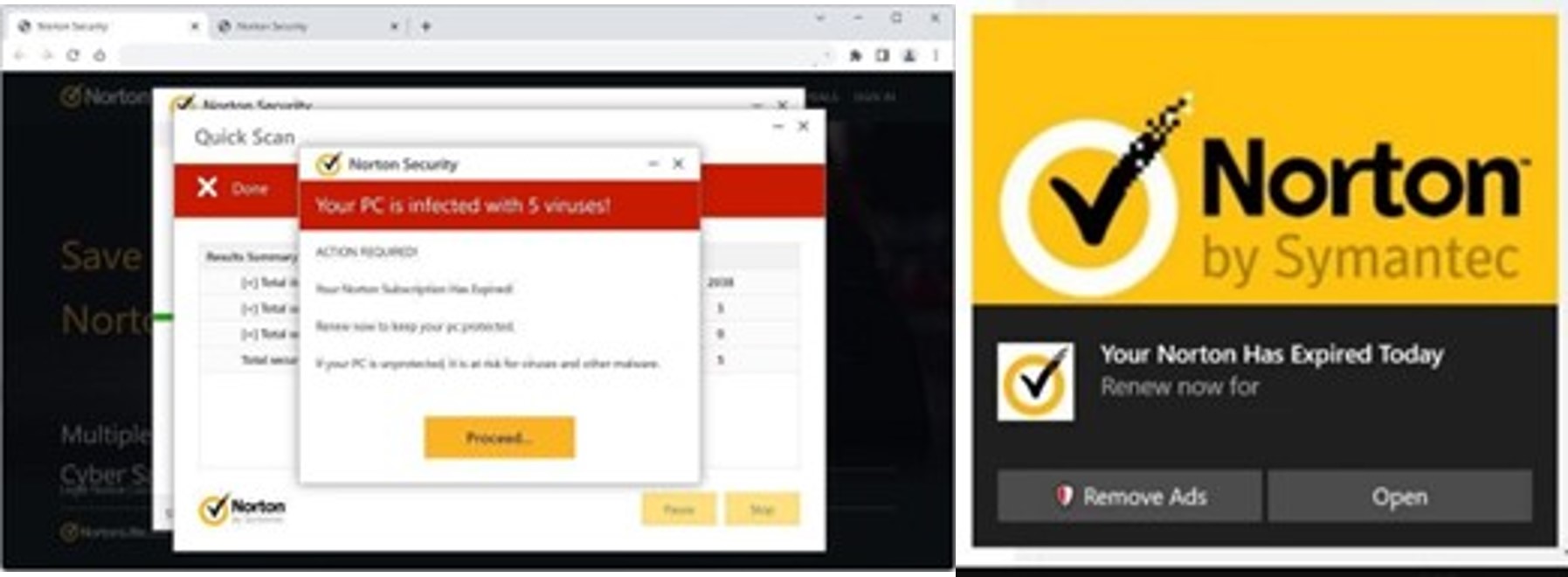
How to spot a fake virus alert?
Several telltale signs can help identify the presence of a counterfeit virus alert on your device:
Payment Requests: Legitimate antivirus services never demand payment before offering their services.
Phone Call Requests: Hackers might provide a phone number, urging you to call and coerce you into divulging banking details for fake antivirus software purchases.
Urgent Tone: Fraudsters frequently instill urgency to convince users of the authenticity of their fabricated virus alert.
Poor Grammar: Some hackers exhibit lack of attention to detail, leading to poor grammar in their fake alerts.
Basic Designs: Some hackers lack the requisite design skills, resulting in unprofessional and unconvincing visual designs for their fake virus alerts.
For individuals encountering such pop-ups persistently, it might become necessary to eliminate the malware responsible for generating these counterfeit virus alerts entirely.




